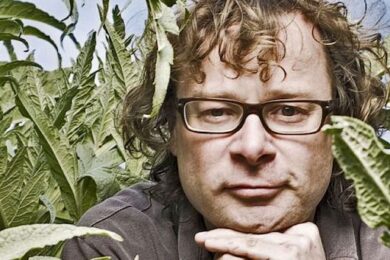David Keenan by Heather Leigh
In the summer of 1978, I made plans to get myself kidnapped by the Men in Black. I had seen an artist’s interpretation of them in a book called UFOs that I bought at a jumble sale. The very next day, I saw my first UFO, travelling at impossible speed and buzzing an aeroplane over the Boots field up behind Colliertree Road in Airdrie. I was seven years old. Following the thrilling injunction of Star Lord comic to “Watch the Skies!” I spent most nights out in the fields with a pair of my grandpa’s binoculars, and Star Lord was right, because the skies were completely alive, populated by spinning satellites, shooting stars, gas giants, constellations and imminent alien technology.
I heard that the Men in Black experimented on you in their UFOs that travelled at the speed of light and then dropped you back in your bed with no memory of it. I had already awakened to the magical nature of Airdrie through a book about the town which documented its witchcraft and magic, and so it was no surprise to me that it would be at the centre of a UFO flap that no one else but me seemed to be aware of. My mum just wouldn’t believe me. I found a UFO touchdown site with actual scorch marks in the grass, but my mum said it was just bad boys escaped from the remand home setting grass on fire.
Every night I would set my battery-powered flashlight on the windowsill next to my bed, which looked out onto a low roof that I thought would be the perfect landing spot for the Men in Black. I set my flashlight to pulse on and off and then I fell asleep. Sometimes in the morning it would still be flashing, and sometimes, mysteriously, not. On the days when I woke and the torch was off, I decided I had been experimented on, probably, and started to get a weird memory of shadowy figures behind frosted glass, so it seemed likely. In the meantime, I continued my other hobby of part-time sleuthing, investigating the reported (by my ancient old neighbour) drowning of a bag of kittens in the burn, even though I hadn’t got any further than taking the old dear’s fingerprints.
Most evenings I hung out at Dennis’s on the main street. His bedroom stank, but he had a pool table, lead figures and lots of sci-fi books, so we would hang out and listen to the first Devo album (his brother’s copy) and also read underground comics. We only bought books from church fetes or school fairs, we never bought new books, instead we used the library, but nevertheless I was building up a good second-hand collection of paperbacks, mostly sci-fi, fantasy and horror, but also stuff like Biggles, who I was obsessed with. The first time I ever felt really high while reading a book was when I read a yearnful passage from some Biggles book at my gran’s house in Calderbank, about a dogfight in the air that made me feel like I was tripping. And plus, I loved the proper English in those books, I longed to talk like Biggles, or Tom Baker, or Patrick Moore, which I think explains my reticence towards dialect, even today. Because I never spoke it.
But then Dennis gives me this book, by Arthur C. Clarke, Rendezvous With Rama, and I get high all over again. I have walked Rama, the mysterious object that briefly enters our solar system, so many times in my mind that Rama exists, forever, and did truly enter our solar system, once. Clarke’s glimpse of alien technology is a true visioning, of inhuman scale, with all of the overwhelming affect of a Moby Dick. My love for doddery old eccentric men in bunnets and with tweed suits and moustaches banging on about astronomy and calligraphy and Latin meant that Clarke quickly ascended to my own heroic inner circle.
1979: I went off the rails when I fell in love with a girl called Marielle. In 1980, I got my first issue of The Unexplained: Mysteries of Mind, Space, & Time. With it there was a flexi disc that claimed to have recordings of the dead speaking from beyond the grave. I had already got in trouble with my mum for playing “depressing” music like Japan on the communal stereo, so I knew there was no way I was going to be allowed to listen to the living dead while anyone was at home, so I waited till I got home from school, before everyone else, before sticking it on. By god, I wish I hadn’t. It was utterly terrifying, genuinely distressing, and so obviously the terrible, contorted suffering sounds of souls in hell. I ran out to the back garden and set the flexi disc on fire. I was shaken up. UFOs and the Men in Black were one thing, but the dead, returning? Maybe I wasn’t cut out for this line of research after all. But then I saw Arthur C Clarke’s Mysterious World on ITV and I recognised my calling. There …



